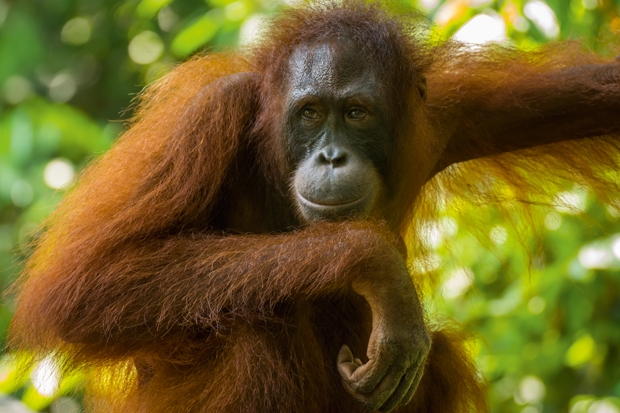King Kong, the story of a violently amorous gorilla, Me Cheeta, the autobiography of a slanderous Hollywood chimpanzee, and now this, a benign biological, psychological and cultural survey, comes in further recognition of the versatility of our primate cousins. Both collateral branches of our family seem doomed (too many humans, too few apes), unless. . . Chris Herzfeld, a philosopher of science, an artist and a founder of the Great Apes Enrichment Project, has written a movingly tragic study in praise of Wattana, a Bornean orangutan. Even the restrained academic publisher calls it ‘poignant’.
Commercial depredations are spoiling Wattana’s ancestral forest habitat at such a rate that the orangutans of Borneo will probably be extinct by 2030. In the meantime, Wattana and other captives surviving in zoos show how intelligent, talented and affectionate orangutans can be.
Herzfeld writes:
The last common ancestors of chimpanzees and humans are thought to have lived six million years ago . . . An orangutan shares approximately 97 per cent of its genes with humans, and it is the great ape that is the least closely related to our species.
Herzfeld summarises the history of primatology all the way from a Carthaginian admiral’s sightings of apes on the coast of West Africa five or six centuries BC. She tells of 15th-century colonial navigators who collected primates to glorify their patrons, and how the Menagerie du Jardin des Plantes was established in Paris immediately after the French Revolution, to exhibit exotic animals to the ordinary public. Many other nations followed suit; now thousands of apes are exhibited in zoos all over the world.
Wattana was born in Antwerp Zoo in 1995. Her young mother abandoned her, so she was bottle-fed by keepers, then reared in Stuttgart for a couple of years, until she was moved to Paris. ‘Wattana had a very chaotic start in her life,’ Herzfeld comments, but in spite of all the separations from family and friends — including humans with whom she had intimately bonded — she remained sociable and eager to imitate human behaviour and learn human skills. She could drink tea with finesse and tie and untie knots with such great dexterity that she achieved Funktionslust, the pleasure of knowing what to do and doing it well.
Until quite recently, primates were kept in solitary confinement in cells kept bare for the sake of hygiene. However, Herzfeld writes,
directors and keepers did begin to show a gradually increasing concern for the welfare of animals in their care. People were finally giving thought to providing captive animals with interesting activities, and hence enabling them to escape the boredom that so often plagues zoo animals. In the Paris zoo, orangutans were given many accessories to pass the time. These included objects to encourage aquatic games (inflatable pools, bucket, watering can) toys, clothes, food mazes and artificial termite nests and sticks, not to extract termites or ants as in the wild, but to collect molasses or honey mixed with dried fruits.
Zoos are submitting primates to psychological and anatomical experiments; in short, they are encouraging them to become more human.
Herzfeld presents her detailed research succinctly and entertainingly, while abiding by scientific discipline. She has obviously developed an empathetic fondness for apes, but she does not predict a possible future closing of ties between humans and primates. Who knows what may be going on in secret? Her book is likely to stimulate readers to speculate about some new, greater liberty. Considered with an open mind, Wattana may not seem poignant after all. For people disappointed by the outcome of single-species mating, Kinsey’s report of lovemaking between different species in rural America and John Collier’s beguiling novel His Monkey Wife offer hope that miscegenation between two closely related species may produce a superior hybrid combining the best of both — human chemical engineering, say, and the orangutan’s family values.






Comments